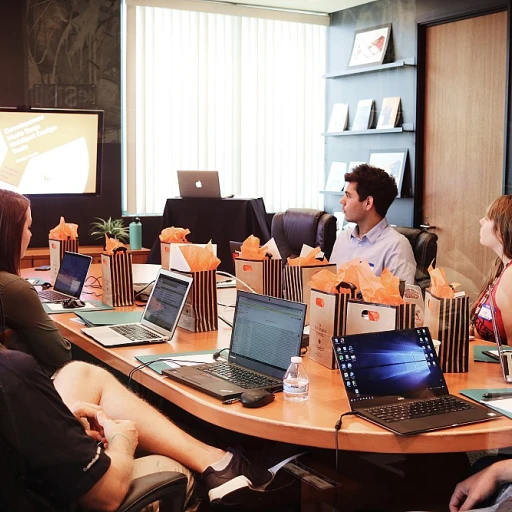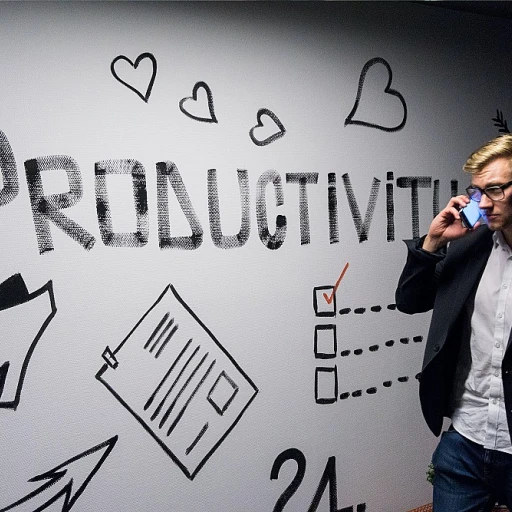
Understanding Talent Assessment
In the ever-evolving landscape of employer branding, understanding the nuances of talent assessment is crucial. It's not just about identifying potential employees; it's about recognizing the unique blend of skills, abilities, and experiences that each candidate brings to the table.
The Essence of Talent Assessment
The hiring process today demands more than the traditional interviews and resumes. Companies are investing in assessment tools that provide a broader perspective on a candidate's personality, performance, and growth potential. This approach enables employers to better understand how a potential team member will fit into the larger picture and contribute to the organization’s success.
Different types of talent assessments give insight into various aspects such as cognitive ability, situational judgment, and specific skills tests. These tools help craft a thorough assessment framework that aligns with the company's needs.
The Role of Personality and Ability Tests
Personality tests and ability tests provide a foundation for understanding how job seekers may interact and perform within a given role. These assessment tests offer invaluable insights not only into the potential of the candidates to excel in particular job roles but also into how they might develop within the organization. The focus is on creating a harmonious environment where employee development thrives, fostering better team dynamics and enhancing overall company growth.
Implementing Successful Assessment Processes
A comprehensive assessment process adopts diverse methodologies, ensuring a thorough understanding of each candidate. Tools like situational judgment scenarios and performance metrics are frequently used to highlight a candidate’s experience and preparedness for the role. Integrating these methods within the full-cycle recruiting strategy enhances the effectiveness and efficiency of the hiring process.
Innovative Assessment Techniques
Revolutionizing Recruitment with Innovative Techniques
In the realm of talent assessment, employing innovative techniques is crucial to streamline the hiring process and accurately gauge each candidate’s potential for success in a specific role. Current approaches often involve a sophisticated mix of performance assessments, skills tests, and cognitive ability evaluations designed to identify key traits and competencies. Employers are increasingly leveraging personality tests and situational judgment exams to deepen their understanding of how candidates might behave in the workplace. These tools offer insights beyond traditional resumes and interviews, helping teams pinpoint candidates with the right mix of talent and potential for growth within their organizations. Innovative assessment frameworks are being developed to incorporate real-world simulations that mirror job tasks. These allow candidates to demonstrate their abilities in a context that resembles their future workplace, which enhances the overall candidate experience by making the assessments more engaging and relevant. Moreover, the introduction of virtual assessment centers and online platforms has expanded the reach and accessibility of these evaluations. This shift not only optimizes the assessment process but also accommodates remote job seekers, thereby enhancing diversity within the hiring pool. For organizations aiming to refine their talent assessment strategy, exploring innovative employer branding techniques can be immensely beneficial. By embracing cutting-edge tools and methodologies, companies can ensure they are well-equipped to identify future team members with the skills, character, and growth potential necessary for success.The Role of Data Analytics
Capitalizing on Analytical Techniques to Enhance Talent Assessment
The application of data analytics in talent assessment is transforming how organizations approach the hiring process and employee development. By leveraging data-driven insights, companies can refine their assessments, ensuring they're selecting candidates with the perfect skills and potential for growth. Utilizing various data analytics tools helps organizations track performance metrics, providing deeper insights into a candidate's suitability for a role. These tools analyze cognitive ability, personality tests, and skills tests to present a comprehensive picture of each candidate. By understanding these metrics, HR teams can pinpoint candidates that not only fit the current job requirements but also align with long-term succession planning and team growth potential. Moreover, adopting an advanced analytics framework helps in identifying trends and patterns across different types of talent assessments. These patterns can reveal which assessment methods yield the most accurate results for specific roles, aiding in the development of a more effective assessment process. Additionally, integrating situational judgment and ability tests within this framework can further predict how potential employees might perform in real-world scenarios. An essential byproduct of using data analytics is the enhancement of candidate experience. Symmetrical feedback loops powered by data allow for greater transparency and can improve the candidate’s perception of the hiring organization. As candidates receive constructive feedback on their performance and growth potential, it significantly helps in building an employer brand known for nurturing talent. For organizations striving to enhance their employer branding with smart HR strategies, data analytics offers a significant edge. By redefining the talent assessment landscape, companies can ensure they not only hire the best possible candidates but also maintain a competitive edge in talent management and employee development. Explore more about how these smart strategies influence employer branding here.Diversity and Inclusion in Talent Assessment
Promoting Diversity and Inclusion Through Talent Assessments
When it comes to enhancing talent assessment within the realm of employer branding, promoting diversity and inclusion is pivotal. Effective diversity strategies ensure that companies capture a wide array of skills and perspectives, ultimately leading to improved team performance and innovation. To begin with, assessment tools need to be calibrated in a way that counterbalances inherent biases. This involves the use of blind assessments where information unrelated to the job roles is temporarily hidden from evaluators. Such initiatives can ensure that the focus remains solely on the candidate's skills and their potential to succeed in the given job role. Furthermore, personality tests and cognitive ability assessments can provide insightful data about a candidate's fit within a diverse team, understanding their strengths and areas for development. Using these tools allows hiring managers to make informed decisions, supporting team member cohesiveness and performance. An inclusive talent assessment process also involves situational judgment tests, which evaluate candidates' responses to work-related scenarios. These tests are designed to reflect real workplace situations that require empathy, problem-solving, and effective communication skills, traits that are essential for harmonious employee interactions in diverse workplaces. Additionally, tools that measure potential cognitive abilities stand out in ensuring a collaborative workforce. An emphasis on diverse abilities fosters succession planning and identifies growth potential among team members, which is a vital aspect of talent management. Incorporating strategies dedicated to achieving a comprehensive talent assessment framework not only helps employers in selecting the right candidate for a job but also plays a significant role in fostering a workplace culture that values diversity and inclusion.Challenges in Talent Assessment
Pitfalls of Ineffective Talent Assessments
In the dynamic process of hiring and integrating new candidates into a team, talent assessments serve as a crucial step to evaluate potential employees. However, there are various challenges that companies often encounter during assessment procedures, which can impact their overall efficiency and success. A key issue faced is aligning assessments with the company's specific goals and culture, which can cause a disconnect between what’s evaluated and the actual necessities of the role.
Overcoming Bias and Ensuring Fairness
One of the most pressing challenges in talent assessment is eliminating biases that might influence the assessment process. Unconscious biases can skew results and lead to less diverse hiring, which can hinder the enrichment that diverse perspectives bring to a team. Implementing objective skills tests and cognitive ability tests, complemented by personality tests, can help ensure a more balanced evaluation.
Balancing Thorough Evaluation and Candidate Experience
While diversity is crucial, providing a positive candidate experience during the hiring process is equally important. Lengthy or overly complex assessments can be overwhelming for candidates, potentially alienating top talent. It's vital to streamline assessments and employ user-friendly assessment tools that respect the candidate’s time and contributions. This enhances the overall candidate experience and leaves a positive impression of the company.
Technical and Logistical Constraints
The logistical aspects of talent assessments can also present difficulties. This includes the integration of sophisticated assessment tools within existing talent management systems and ensuring that the assessments themselves are scalable and adaptable for remote work environments. Solutions need to be efficient, without imposing excessive demands on resources or team members conducting the evaluations.
Institutionalizing an Effective Assessment Framework
Developing an effective assessment framework that includes diverse types of talent assessments can help mitigate these challenges. Investing in innovative assessment tools that accurately measure growth potential, situational judgment, and performance, will support better hiring decisions. Furthermore, integrating succession planning into talent assessment allows for strategic long-term employee development, making sure that team members are well-prepared for future roles.
Future Trends in Talent Assessment
Emerging Directions for Talent Evaluations
The landscape of talent assessment is continuously evolving, with new trends and methods shaping the way companies evaluate candidates and employees. As organizations strive to enhance their hiring process, it is crucial to understand the future trends that are likely to influence talent assessments.
One significant trend is the increasing use of artificial intelligence and machine learning tools to streamline the assessment process. These technologies can help analyze candidate data more efficiently, leading to better identification of skills and growth potential. By leveraging AI, companies can also create more personalized assessments tailored to specific roles or candidate profiles, thereby improving the candidate experience.
Cognitive ability tests and personality tests are becoming more integrated with other types of talent assessments. The combination of these assessments helps create a more holistic picture of a candidate's capabilities, including personality traits, cognitive skills, and situational judgment. This integration supports a more comprehensive evaluation of both the immediate performance potential and the long-term development of employees.
Moreover, there is a growing emphasis on continuous assessment, where employees are regularly evaluated rather than through one-time assessments during hiring. This shift allows organizations to be proactive in talent management and succession planning by identifying team members' development needs and growth potential over time.
Diversifying assessment methods is also a notable trend. Traditional assessment tools are being supplemented with more innovative approaches, such as virtual reality simulations and gamified assessments. These alternatives provide a dynamic and engaging way to measure skills and performance, offering candidates a unique and enjoyable experience in the assessment process.
The integration of these emerging trends will continue to reshape how companies approach talent assessment. By incorporating innovative techniques and focusing on data-driven insights, organizations can ensure a more effective and inclusive assessment framework, ultimately helping to secure the best-fit candidates for their teams.













